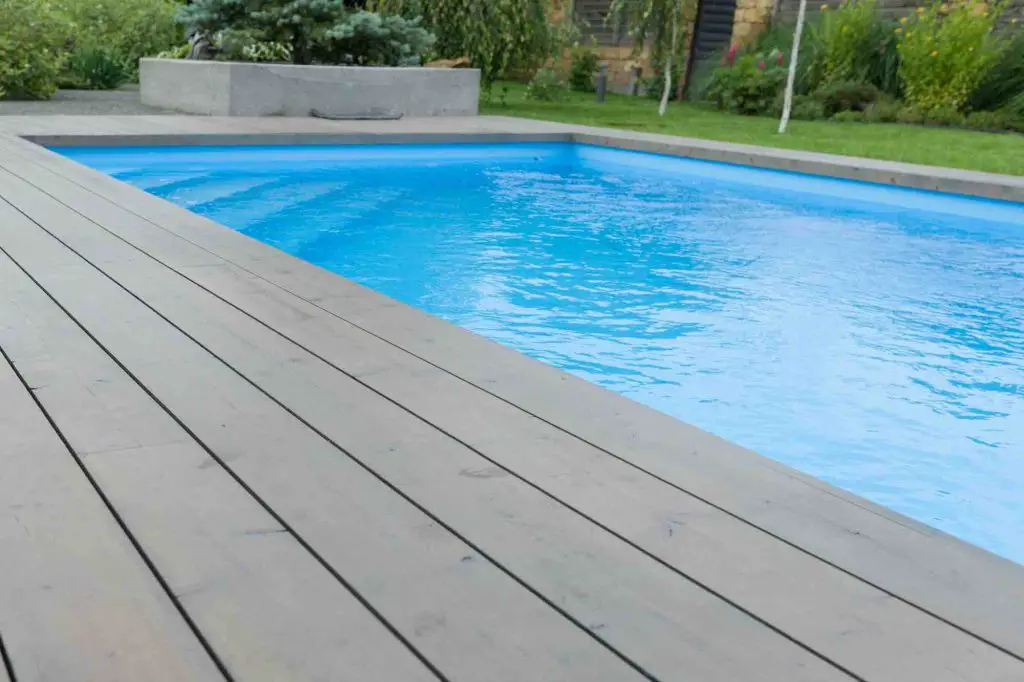Nothing quite screams summer like a pool deck. Whether entertaining guests or enjoying quality time with your family, a pool deck is the perfect place to relax and soak up the sun. But before you can enjoy your pool deck, there’s one important question you need to answer: does a pool deck need to be bonded?
A pool deck needs to be bonded to avoid electrical hazards. Without bonding, there’s a risk of electrocution if someone touches the metal railing or other parts of the pool deck while standing in the water. The electrocution comes from the stray voltage that can build up without proper grounding.
Let’s explore further what pool deck bonding is and how it can help keep your pool deck safe. We will also touch on the National Electric Code (NEC) and how it applies to pool decks and offer step-by-step instructions on how to bond your pool deck properly.

What Is Pool Deck Bonding?
Bonding is the process of connecting all the pool’s metallic and electrical components with a wire to create a non-resistive path, which is then connected to a grounding rod. The main purpose is to create an electrical path to the earth so that any stray voltage can be safely discharged.
The National Electric Code (NEC) requires all pools to be bonded. This helps reduce the risk of electrocution and other electrical hazards. The following components must be bonded:
- All metal parts of the pool, including the ladder, handrails, diving board, and any metal reinforcing in the concrete.
- Any metal pipes or fittings that are part of the pool’s recirculating system.
- All electrically operated pool lights.
- Any metal parts related to the pool’s electrical equipment like pumps, filters, and heaters.
- Any metal patio furniture within 5 feet (1.5 m) of the pool, including deck umbrella poles, water volleyball poles, and chaise lounges.
The pool itself MUST also be bonded for overall safety. This is achieved by bonding a metal fixture, i.e., the pool’s handrails that are in direct contact with the pool water. Bonding also mitigates lightning strikes that can shock swimmers or damage pool equipment.
The NEC requires a minimum of 8 AWG (American Wire Gauge) copper wire for bonding. This ensures enough conductivity to safely discharge any stray voltage.
How To Bond a Pool Deck
Proper pool deck bonding is essential to maintaining the safety and tranquility of your backyard oasis. An improperly bonded pool deck can present a potentially life-threatening hazard to pool users and damage your pool equipment.
While you can bond your pool deck yourself, we recommend hiring a licensed electrician to ensure the job is done correctly and meets all local building codes. If you choose to bond your pool deck yourself, here are the steps you need to follow:
Inspect Your Pool and Pool Deck
The first step is to inspect your pool and pool deck thoroughly. Identify all the metallic and electrical components that need to be bonded. This includes the pool, metal pipes or fittings, metal patio furniture, and electrically operated pool lights.
You can list all the components that need to be bonded or take pictures for reference. Additionally, look for any cracks or damaged areas in the concrete, metal, or electrical components. These need to be repaired before bonding.
Choose the Right Wire for Bonding
You need to use a minimum of 8 AWG copper wire for bonding. The wire must also be durable and resistant to corrosion. For larger pools, you may need a 6 AWG for added protection. Consult with a local electrician or your pool’s manufacturer to determine the best type of wire for your pool deck.
Shut Off the Power
Before beginning any work on your pool deck, you MUST shut off the power to avoid electrocution. Locate your home’s main breaker box and switch off the breaker that controls the power to your pool.
If you’re unsure which breaker controls the pool, you can shut off all the power to be safe. Once the power is off, test any electrical components with a circuit tester to ensure there’s no power running.
Install Grounding Rods
Grounding rods are an essential part of the pool deck bonding process. The NEC requires a minimum of two grounding rods to be installed. The rods must be driven into the ground at least 8 feet (2.4 m) in a spot at least 10 feet (3 m) away from the pool. The rods should be made of non-corroding material like copper or galvanized steel.
Connect the Grounding Rods to the Wire
Once the grounding rods are installed, you can connect them to the wire. Use a minimum of 8 AWG copper wires to connect the grounding rods to the pool deck’s metal components. You can use lugs and clamps or specialty connectors for bonding pools. Follow the manufacturer’s instructions when connecting the wire to the grounding rods.
Connect the Wire to the Metal Components
The final step is to connect the wire to all the metal and electrical components on the pool deck. This includes the pool, metal pipes and fittings, underwater lighting fixtures, electrical pool equipment, and any metal patio furniture. Ensure all the connections are secure and tight. A slight mistake in the bonding process can create a potential hazard.
Test the Bonding
After all the connections have been made, you need to test the pool deck bonding to ensure it’s adequate. Use a multimeter or circuit tester to measure the voltage between the grounding rods and each metal component.
It should register a voltage of less than 0.5V. If it’s higher, the connection may have a problem. You can also use a pool tester to test the water’s conductivity. The readings should be 2.5 to 3 mS/cm. If the readings are too high or low, the bonding may need to be adjusted.
Turn on the Power
Once you’ve confirmed that the pool deck bonding is adequate, you can turn on the power to the pool. Test all the electrical components to make sure they’re working correctly. If everything is in working order, then you’ve successfully bonded your pool deck!

Final Thoughts
Bonding a pool deck is essential to prevent electrocution. Without proper bonding, stray voltage can build up and cause serious injuries.
Always consult a professional electrician before starting any work on your pool deck. They can help you choose suitable materials and ensure the bonding is done correctly. Follow the NEC’s guidelines to bond your pool deck safely and effectively.
